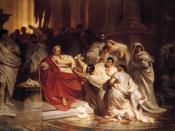In the play, "Julius Caesar" by William Shakespeare, the themes of friendship between men, jealousy, betrayal, and death are ever-present. In Act 1, Brutus is feeling betrayed by Caesar's success. Although he loves Caesar, he wants to get supporters, conspire against him, and eventually kill him. He speaks to Cassius and the other Senators to convince them to feel the same way. By Act 2, others have learned of Brutus' plan, and Caesar's true friends try to warn him in order to save his life. However, being a loyal and trusting friend, Caesar does not listen to the warnings. He does not believe that one of his closest friends would ever go against him. Once Caesar is dead (Act 3) the conspirators feel some relief. They believe his death was necessary and don't try to hide their actions. Later in the play, the Senators start to feel some remorse.
Cassius now understands that Brutus manipulated him, and feels bad for not "bearing his friend's infirmities". By the end of the play, those who have killed Caesar feel the repercussions of their actions. They are burdened by guilt and have no choice but to kill themselves.
First, in Act 1, Brutus is feeling betrayed by his good friend Caesar. Caesar had great success, and even though he and Brutus were very similar, Brutus did not. Although he was happy for his friend, he had some feelings of jealousy. In his mind, he questions why Caesar was destined for greatness over him. Was he a better person? Brutus becomes very unhappy, and the fact that Caesar did not notice his frustration makes Brutus doubt their friendship even further. There are no answers to his questions, so he chooses a negative approach- conspire against Caesar and kill him. He believes this is...


